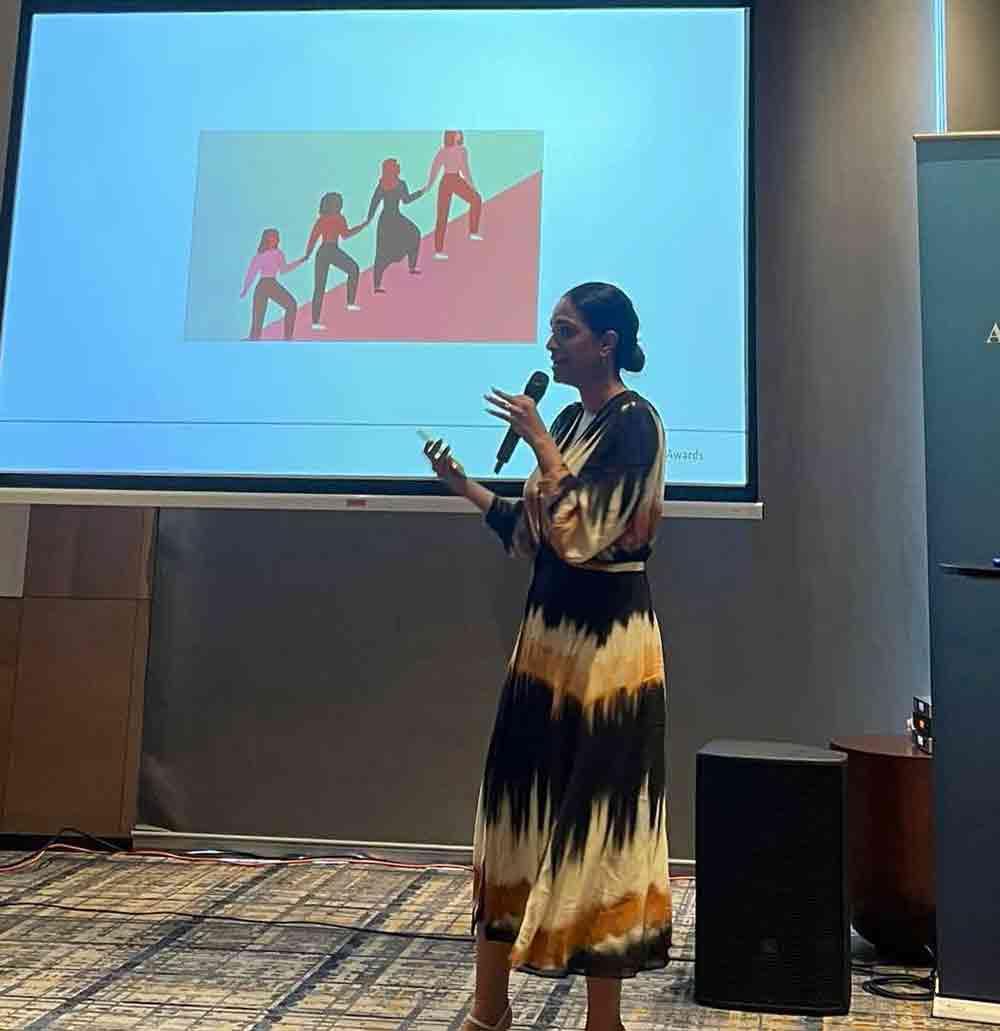
 Inakshi Tillekeratne, a Chartered Accountant (ACCA), exemplifies what it means to lead with agility and precision in today’s fast-evolving business world. As Head of Finance and Admin Operations at Atlas Labs; Sri Lanka’s premier center for rapid prototyping and full-cycle product development, she orchestrates operations across a uniquely collaborative ecosystem, blending finance, human resources, and technology to deliver world-class innovations. Inakshi’s strategic foresight and hands-on leadership have not only accelerated Atlas Labs' growth trajectory but also shaped its new U.S.-based equestrian technology venture, Horcery, where she leads financial and operational efforts. A problem-solver at heart, Inakshi wears multiple hats with clarity and focus, bridging strategic imperatives with operational realities. In this candid conversation, she reflects on her leadership philosophy, her approach to building scalable systems, and the balancing act of life and work as a young professional in a fast-paced industry, while offering insights for those looking to follow a similarly multifaceted path.
Inakshi Tillekeratne, a Chartered Accountant (ACCA), exemplifies what it means to lead with agility and precision in today’s fast-evolving business world. As Head of Finance and Admin Operations at Atlas Labs; Sri Lanka’s premier center for rapid prototyping and full-cycle product development, she orchestrates operations across a uniquely collaborative ecosystem, blending finance, human resources, and technology to deliver world-class innovations. Inakshi’s strategic foresight and hands-on leadership have not only accelerated Atlas Labs' growth trajectory but also shaped its new U.S.-based equestrian technology venture, Horcery, where she leads financial and operational efforts. A problem-solver at heart, Inakshi wears multiple hats with clarity and focus, bridging strategic imperatives with operational realities. In this candid conversation, she reflects on her leadership philosophy, her approach to building scalable systems, and the balancing act of life and work as a young professional in a fast-paced industry, while offering insights for those looking to follow a similarly multifaceted path.
Q You’ve successfully led finance and operations across global teams. What leadership principles guide your approach in high-growth environments?
My leadership philosophy is adaptive, but it's grounded in one core principle: enable your team. In a hyper-growth setting, variables shift daily, yet people still need three constants from their leader: clarity, trust, and resources. I start by listening to understand the context, then remove obstacles and secure the support they need. The aim is to empower the experts to achieve excellence.
Q In a startup setting, what does 'wearing multiple hats' truly look like, and how do you balance strategic versus operational priorities?
Essentially, it's stepping in wherever the need is greatest. You do what needs to be done. In 2022, to support our rapid growth, I headed a renovation project where we converted a warehouse into a new office in eight months, despite having no construction experience, and this was during the height of the economic crisis. That’s the balance in its purest form. The strategic 'why,' our company’s survival and growth, demanded a very hands-on, operational 'how.' Some days you’re setting the vision, and other days you’re rolling up your sleeves to get things done. By keeping transparent priorities and using quick, recurring syncs with key stakeholders, I ensure that urgent fires don’t eclipse our long-term goal and that every tactical decision aligns with our overarching vision.
A title doesn’t define your impact. Early in my career, I decided not to limit myself to a single job role. I’m driven by a desire to solve problems, and a startup environment lets you step beyond the job description.
Q You led financial projections and capital raising efforts for Horcery. What were the key strategies or lessons from that fundraising journey?
When I put together financial projections, I follow a simple strategy: ensure the projections are a direct reflection of the business strategy. To do this, I work across all teams to understand the go-to-market plan, operational milestones, and hiring roadmap, and then translate that complete story into numbers. The financials must clearly articulate to investors what the company will achieve, both strategically and financially. The biggest lesson? Don’t get lost in the details. Investors are backing the plan and the team. The numbers must be sound, but they’re just the narrative’s language; not the story itself.
Q When building the finance function from scratch, what were the non-negotiables you had to implement early on to ensure long-term sustainability?
It might sound obvious, but it all comes down to implementing processes, or as we accountants call it, "strong internal controls." My training as an Internal Auditor showed me firsthand what happens when processes break down. That’s why I always start with fundamentals: establishing a clear financial framework, enforcing practical segregation of duties, and maintaining rigorous, constant visibility over cash flow. This is my absolute non-negotiable. Without it, scale becomes chaos.

Q You’ve handled leadership hiring, onboarding, and HR systems. What qualities do you look for when building leadership teams in startups?
I look for people with common sense and logic. While technical skills are important, they can almost always be taught. What truly defines a leader is foundational character. Do they have a hunger to achieve something in life? Is there a relentless internal drive that pushes them toward excellence? It’s a rare combination of traits. But when you find the ones who do, you lock them down and build a team around them.
Q As a newly married young career woman, how do you envision your future in the corporate world, especially while continuing to lead and evolve in a fast-paced industry?
It’s interesting how this question still gets asked of women but rarely of men. I believe that the premise, that marriage inherently changes a woman's career trajectory, is rooted in outdated assumptions. My vision for my future is the same as before I got married: to innovate and make a meaningful impact. Marriage, like any great partnership, is an amplifier, not a constraint. I see it as another source of strength in my journey.
Q You’re a Chartered Accountant with a diverse role that goes beyond finance. What inspired you to expand your professional scope so widely?
A title doesn’t define your impact. Early in my career, I decided not to limit myself to a single job role. I’m driven by a desire to solve problems, and a startup environment lets you step beyond the job description. Whether the challenge was in people operations or technical ops, I took it as an opportunity to learn and contribute. Over time, those “side quests” became core skills and expanded my professional scope organically.
Q How do you continue to learn and evolve as a leader across multiple disciplines, finance, HR, and tech operations?
By listening. By surrounding myself with people who are smarter than me in different domains. I’ve learned never to be afraid to ask questions. True leadership is understanding that you don’t have all the answers. For me, growth is about humility, curiosity, and a commitment to staying open.
Q What advice would you give to young finance professionals looking to enter the startup space and make an impact beyond the numbers?
AI is fundamentally changing the finance role. My advice is twofold: first, master AI tools to amplify your productivity. Second, become a sponge, aggressively pursue skills beyond your core role. Numbers are important, but your differentiator will be your ability to think beyond them, to see the whole picture, and to connect cross-functional dots. That’s what makes you invaluable in a startup.

Q What’s next for you personally and professionally? Are there areas you’re looking to explore or deepen your expertise in?
I’m focused on my own "becoming," as Michelle Obama says. That means pursuing initiatives that align with my values, innovation, equity, and meaningful impact. I’m embracing discomfort as a catalyst for growth, nurturing meaningful relationships, and maintaining balance. Professionally, I’m exploring ways to drive operational excellence in technology ventures with a human-first approach. Personally, I’m committed to continuing to evolve through curiosity, reflection, and seeking out challenges that stretch me further.
RAPID FIRE ROUND
- Numbers or people? People. Numbers tell the story; people write it.

- Startup hustle or corporate structure? Startup hustle; without a doubt!
- Most-used app on your phone? Instagram - an addiction I’m actively trying to break.
- One word your team would use to describe you? Intentional.
- Coffee or tea to get through a long day? Coffee.
- Morning meetings or late-night planning? Morning meetings.
- Book that changed your perspective on leadership? Multipliers by Liz Wiseman.
- One habit that keeps you productive? Working out; my fitness journey has changed my life.
- If not finance, what would you be doing? Honestly, my current role is already the "if not finance" job I would have wanted.
- Your leadership style in one word? Enabling.











